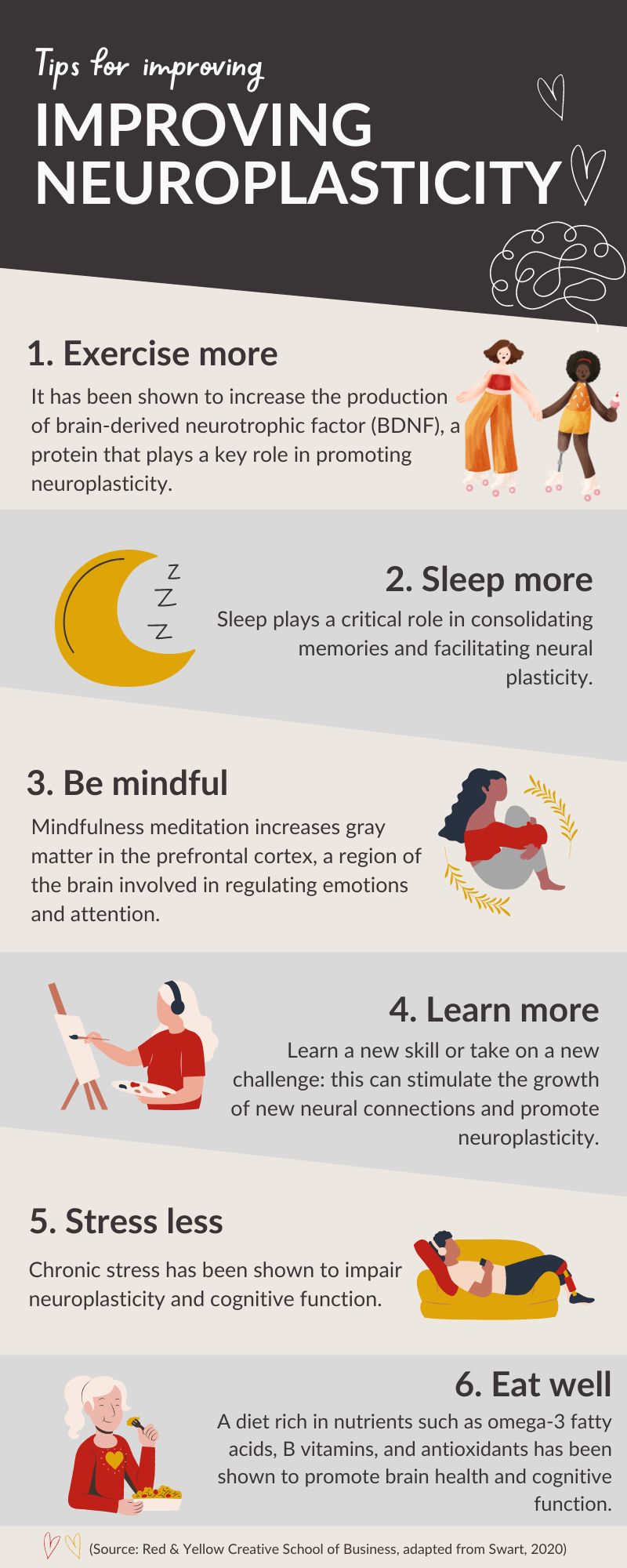In today’s rapidly changing world, it is becoming increasingly important to be a lifelong learner. The 4th Industrial Revolution (4IR) has and is still transforming the way we work, with the introduction of technological advancements in artificial intelligence (AI), machine learning and natural language processing, all of which may make certain skills and professions obsolete.
WHAT IS NEUROPLASTICITY?
The ability to learn and adapt to new situations has become a necessary skill, and it is no longer sufficient to rely solely on the knowledge and skills acquired during formal education. Fortunately, the human brain has an incredible capacity for learning and adapting, regardless of a person’s age. This capacity, known as neuroplasticity, is what enables us to continue learning and growing throughout our lives.
Neuroplasticity is the ability of the brain to reorganise and adapt its structure and function in response to new experiences and learnings. This means that, even as we age, our brains have the ability to create new neural connections and pathways. This allows us to continue learning new skills and acquiring knowledge. Dr Tara Swart, who is a neuroscientist and senior lecturer at Massachusetts Institute of Technology (MIT), has conducted extensive research on the relationship between the brain and learning. Her findings support the importance of lifelong learning (Swart, 2020).
THE BENEFITS OF LIFELONG LEARNING
Swart’s research has shown that engaging in regular learning activities can have a significant impact on the brain’s structure and function. Learning new skills and acquiring knowledge can stimulate the growth of new neural connections and increase the brain’s overall plasticity. This can have a range of positive effects on cognitive function, including improved memory, attention, and problem-solving skills (Swart, 2020).
One of the most important aspects of lifelong learning is that it can help to protect against cognitive decline and age-related cognitive diseases such as dementia. Several studies have shown that individuals who engage in regular learning activities throughout their lives are less likely to experience cognitive decline in old age. This is because learning stimulates the brain and helps to keep it active and engaged, which can help to maintain cognitive function and prevent cognitive decline (University of Delaware, 2021; Park and Bischof, 2013).
There are many ways to engage in lifelong learning, and the options are more abundant than ever before. Online learning platforms offer a wide range of courses on various topics, making it easy for individuals to learn at their own pace and from the comfort of their own homes. In-person classes, workshops, and seminars are also available, and can provide valuable opportunities for hands-on learning and social interaction.

KEEPING AN OPEN MINDSET
In addition to formal learning activities, there are many other ways to stimulate the brain and promote neuroplasticity. Engaging in hobbies, learning new languages, playing musical instruments, and engaging in physical activity are all activities that have been shown to promote brain plasticity and cognitive function. Social interaction is also important, as it has been shown to have a positive impact on cognitive function, particularly in older adults (Medical News Today, 2021; Swart 2020).
It is important to note that lifelong learning is not just about acquiring new knowledge and skills; it is also about developing a growth mindset and a willingness to embrace new challenges. When we approach new experiences with an open mind and a willingness to learn, we are more likely to succeed and to continue growing and developing throughout our lives.
PROMOTING NEUROPLASTICITY IS SIMPLE
There are also many other ways to engage in lifelong learning and promote neuroplasticity from the comfort of your own home. Two additional tips include: (1) reading – it is a great way to stimulate the brain and promote neuroplasticity; and (2) engaging in brain games. There are many apps and websites that offer brain games and puzzles that can help to improve cognitive function and promote neuroplasticity. Some popular options include Lumosity and Elevate.
By incorporating these activities into your daily routine, you can promote neuroplasticity and continue to learn and grow throughout your life. Remember, the key is to approach new experiences with an open mind and a willingness to learn. With a growth mindset, anything is possible.
Lifelong learning is becoming essential in today’s rapidly changing world. With 4IR transforming the job market, individuals therefore need to continually upskill and adapt to remain relevant. With the growing recognition of neuroplasticity, there is an understanding that the brain can continue to learn new things regardless of age. So, grab that book, find that brain game, and sign up for those electric guitar lessons! Happy learning!

Ashley Young, Head of Sales
Ashley Young has over 12 years of experience in education, including nine years in online education. He is currently the Head of Admissions/Sales at Red & Yellow Creative School of Business and is passionate about ensuring high-quality education in Africa. He has worked for GetSmarter/2U/edX in various roles and gained insight into full-time, part-time, distance, and online education. Ashley also has experience working with B2B clients to align training needs with organisational requirements.
Bibliography
Cohen, S., Janicki-Deverts, D., and Miller, G. E. (2007), ‘Psychological stress and disease’. Jama. 298(14), 1685-1687.
Gómez-Pinilla, F. (2008), ‘Brain foods: the effects of nutrients on brain function’. Nature Reviews Neuroscience. 9(7): 568-578.
Gotink, R. A., Meijboom, R., Vernooij, M. W., Smits, M., and Hunink, M. G. (2016), ‘8-week mindfulness based stress reduction induces brain changes similar to traditional long-term meditation practice–a systematic review’. Brain and Cognition. 108: 32-41.
Hillman, C. H., Erickson, K. I., and Kramer, A. F. (2008), ‘Be smart, exercise your heart: exercise effects on brain and cognition’. Nature Reviews Neuroscience. 9(1): 58-65.
Mander, B. A., Winer, J. R., and Walker, M. P. (2017), ‘Sleep and human aging’. Neuron. 94(1): 19-36.
Medical News Today (2021), ‘Can music help train our brains to delay cognitive decline?’ https://www.medicalnewstoday.com/articles/can-music-help-train-our-brains-to-delay-cognitive-decline#Practicing-music-5-days-a-week-for-30-minutes. Accessed 3 May 2023.
Park, D. C., and Bischof, G. N. (2013), ‘The aging mind: neuroplasticity in response to cognitive training’. Dialogues in Clinical Neuroscience. 15(1): 109-119.
Swart, T. (2020), The Source: Open Your Mind, Change Your Life. London, Penguin Random House.
University of Delaware (2021), ‘UD’s OLLI program – a year to adapt, grow and survive’. www.olli.udel.edu. Accessed 3 May 2023.


